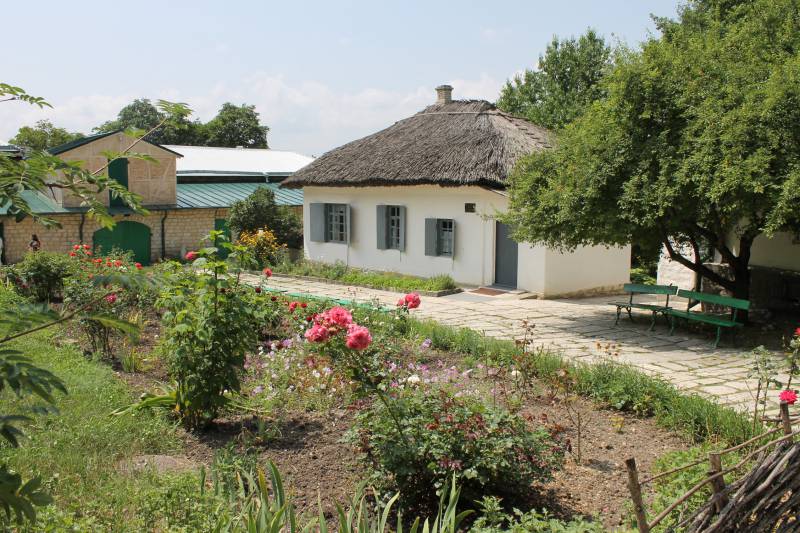The Niva magazine about the duel of M.Yu. Lermontov
Modern monument at the duel site M.Yu. Lermontov. The place of the duel was determined in 1881 by a special commission.
“More than half a century has passed since the day of the fatal duel between Lermontov and Martynov; but so far neither the true reason, nor the real reason for this tragic accident was known to the Russian public. The son of Nikolai Solomonovich Martynov, who carried on himself half a century the grave nickname of the killer Lermontov, tells the Russian Review, in the words of his late father, the real history this duel.
We give here detailed extracts from this article, which, of course, cannot but interest readers of Niva.
Martynov, during his lifetime, was always under the yoke of remorse of his conscience, tormenting him with memories of his unfortunate duel, about which he did not like to talk at all, and only on Holy Week, and also on July 10, on the anniversary of his duel, did he tell more or less less detail his story.
The Martynov family, living permanently in Moscow and having, like Grandma Lermontov, Arsenyev, a manor in the Penza province, had long been in excellent relations with the family of the poet from the maternal side. It is not surprising, therefore, that Mikhail Yuryevich Lermontov, living in Moscow in the late twenties and early thirties, often visited the home of his father Martynov, whom he met his daughters, and one of them, Natalia Solomonovna, later Countess De-Turdon, liked him very much .
House of the poet in Pyatigorsk
In 1837, fate again brought the poet to Martynov in the Caucasus, where Lermontov was exiled, as you know, for his poems “To Pushkin's Death”, and Martynov was transferred as a volunteer from a cavalier regiment. In the summer of this year, his sick father came to Pyatigorsk on the waters, accompanied by his entire family, including Natalie, who at the time was an 18-year-old and had grown into a magnificent beauty.
Once at the end of September, Martynov arrived in the detachment of Lermontov, who, having taken out of his wallet 300 p. in banknotes, he explained to him that this money had been sent to him from Pyatigorsk by his father, and were together with Natalie's letter in a large envelope, which was kept in a suitcase stolen from him in the city of Taman by a gypsy. “For whom do you take me, Lermontov, so that I agree to accept from you the money that was stolen from you - I don’t know, but I won’t take this money from you, and I don’t need it,” answered Martynov. “I can’t leave them at home either, and if you don’t accept them from me, then I will present them on your behalf to the songs of your regiment,” Lermontov answered, and then, with Martynov’s consent, he sent for the songwriters, which they After hearing a dashing Cossack song, on behalf of Martynov gave the money.
Martynov 5 of October 1837 wrote to his father: “Three hundred rubles that you sent me through Lermontov received, but no letters, because he was robbed on the road and this money invested in the letter was also lost; but he, of course, gave me his. " In this letter, apparently, Martynov, unwilling, probably, to disturb his father with the news that he did not accept money from Lermontov and that he himself was sitting penniless, hid this circumstance from him. During a personal meeting with his father and sisters, Martynov learned from them that Lermontov, living in Pyatigorsk and seeing each other daily, somehow announced to them that he was going to the detachment where he would see him, and then asked Natalia Solomonovna to send a letter with him to brother She agreed and, putting her Pyatigorsk diary and a letter to her brother in a large envelope, handed it to her father, asking him if he would like to add anything from himself. “Well, bring me your letter, and I, perhaps, will add something else from myself,” answered the father, who knew that the son in the detachment might need money, and invested three hundred rubles in banknotes in his letter, and not his daughter Nor did I say a word to Lermontov about it. “I think,” said Martynov’s father, “that if Lermontov found out that three hundred rubles was invested in the letter, then he opened the letter.” In his opinion, Lermontov, instigated by curiosity, wanted to know what opinion of him his girlfriend, for whom he wrote one of the poems under the heading “I, Mother of God, Now with Prayer,” etc., revealed the letter and, finding 300 rubles in it, which he was not warned about, and seeing the impossibility of concealing the actions done, came up with a story about the casket being stolen from him by a Gypsy woman and brought money to Martynov.
Subsequently, in 1840, Lermontov, in his defense, placed in the “Hero of Our Time” a separate story “Taman”, in which he described this incident.
Anyway, after this incident, Lermontov, feeling completely guilty before Martynov and wanting to admit this act, began to bother him in every possible way with his sarcasm, so that he once in a close friendly circle warned him that he could only endure his words yourself at home or in a circle of friends, but not in the ladies' society; Lermontov bit his lip and walked away without saying a word.
And this is the decor of one of the rooms of this dwelling.
For some time, he really ceased to annoy Martynov with his venomous mockery, but then forgot his warning and again started on the old.
In the summer of 1841, Mr. Martynov, having retired for the duration of his service, arrived in Pyatigorsk, where at that time all the “jeunesse doree”, serving from the Caucasus, as well as visitors from Russia, had gathered. They spent time having fun: there were balls, routs, carnivals and other amusements every day.
Of the young ladies, the young girls of Versyline, the daughters of Pyatigorsk old inhabitant, Versylina, especially attracted attention. Among them, especially distinguished by its beauty and wit, Emilia Alexandrovna.
Somehow, in the last days of June or in the first days of July, in the evening at the Werzilins of Lermontov and Martynov, as usual, they courted Emilia Alexandrovna.
Martynov was accustomed to take up a dagger with his hand, the obligatory accessory of the Caucasian Cossack costume, which he, who had just come from the Grebensky regiment, continued to wear.
The living room in the house of the Big Brothers, where this all happened ...
After talking for a while with Emilia Alexandrovna, Martynov walked a few steps away from her, and, as usual, took the dagger's handle, and he immediately heard the mocking words of Lermontov, Mrs. Verzilina “Apres quoi Martynow croit de son devoir de se metre en position” (After which Martynov considers himself obliged to return the position.) Martynov clearly heard these words, but being a well-bred man and not wanting to take up history in the family house, he was silent and did not say a single word to Lermontov, so that, according to Vasilchikov, none of those who had clashed him I didn’t notice the news with Lermontov, but when I left the house of the Big Brothers, he took Lermontov by the arm on the boulevard and went on with him. "Je vous ai prevenu, Lermontow, que je ne souffrirais plus vos sarcasmes dans le monde, et cependant vous recommencez de nouveau" ("I warned you, Lermontov, that I no longer intend to endure in the company of your poisonous mockery, but you take up old), Martynov told him in French, and added in Russian in a calm tone: "I will make you stop." “But you know, Martynov, that I am not afraid of the duel and will never give up on it,” Lermontov answered with bile. “Well, in that case, tomorrow you will have my seconds,” said Martynov and went to his home, where that evening he invited his friend Leib-Hussar officer Glebov, whom he asked for the next morning than light, to go to Lermontov and pass him a formal challenge to a duel. Glebov, returning from Lermontov, told Martynov that he had received him and that Lermontov had chosen Prince Alexander Illarionovich Vasilchikov as his official second.
The bout was scheduled for 15 on July 1841 of the year at 6 and a half hours in the evening, at the foot of Mashuk Mountain, half a vertex from Pyatigorsk.
Although Martynov was well aware that Lermontov had an excellent possession of a pistol, from which he shot almost without a miss, and Martynov himself, as is well certified by the second Glebov, did not know how to shoot, ... nevertheless, with the carelessness of his youth - he was only 25 Years, at the end of the fifth hour, he ordered to ride his trotter, and he gave up his running jerks to his second, Glebov.
Living room at home A.A. Alyabyev - author of the famous "Nightingale". Then about all the people of the corresponding class lived.
The day was extremely sweltering and hot: there was an approaching thunderstorm in the air. Arriving at the duel with Glebov at the same time as Lermontov and Vasilchikov, they found the seconds there - Trubetskoy and Stolypin and many other common friends in Pyatigorsk, numbering up to forty people.
Bearing in mind that Martynov’s clash with Lermontov happened, as was said above, around June 29, and the duel itself took place almost two weeks later, it is clear that the news of her had already spread throughout Pyatigorsk. Glebov and Vasilchikov didn’t say a word about the audience’s presence in order not to subject them to responsibility for allowing and not reporting about it.
The barrier was determined by the seconds to fifteen steps, and on both sides a pile of stones was laid, and from it, ten steps each, were duelists who had the right to shoot from their place or go to the barrier.
Opponents were given a pistol in their hands, and one of the seconds waved his handkerchief in a sign that the duel had begun. Lermontov stood in breeches and a red Kanaus shirt, and with apparent or real carelessness began to eat cherries and spit out bones. He stood in his place, hiding behind his hand and a pistol, and pointing the latter directly at Martynov.
A minute passed, showing, as happens in such cases, with all the present eternity. Neither Lermontov nor Martynov fired and stood in their places. The seconds and those present began shivering and making remarks between themselves, which partly reached Martynov's ear. “We need to finish,” said someone, “we are already wet through.” Martynov walked quickly to the barrier, pointed the gun at Lermontov and fired ...
When the smoke cleared, he saw Lermontov lying motionless on the ground. His body was twitching with light convulsions, and when Martynov rushed to say goodbye to him, Lermontov was already dead.
From the place of the duel, Martynov went to the commandant, to whom he announced the unfortunate event. The commandant ordered to arrest him and both seconds, and the investigation began, at the beginning of which Martynov learned from Glebov that during negotiations on the conditions of the duel Lermontov had told his second Vasilchikov: “No, I am so guilty before Martynov that I feel my hand it will not rise. " Whether Lermontov hinted at the opening of the letter or the absurdity of his outburst at the evening with the Verzilins, Martynov was left unknown, but his son still vividly remembers the words of his father: "Tell me about these words Vasilchikov or whoever, I would extend a hand of reconciliation to our Lermontov, and duel, of course, would not be ".
Martynov, having spent his entire previous life in military service, petitioned to betray him to a military court, not a civilian court.
His request was respected, and Martynov was sentenced to a deprivation of the ranks and all rights of the state by a maxim of the Pyatigorsk military court, which maxim was at first softened by the commander of the left flank, then the commander-in-chief in the Caucasus, the war minister and the emperor Nicholas I, who was 3. January 1842 of the year put the following resolution: "Mayor Martynov stand in the fortress for three months, and then bring it to church repentance."
About two years before his death, General Velyaminov told Martynov’s second son that Emperor Nicholas I, who usually spent his summer in Peterhof, where Velyaminov was in cameras in 1841, and who used to collect all those present after the holidays on holidays his retinues, who were informed of the most interesting news he received, expressed the following about Lermontov’s death: “Today I received sad news: our poet Lermontov, who gave such great hopes to Russia, was killed in a duel. Russia has lost a lot in it. ”





Information